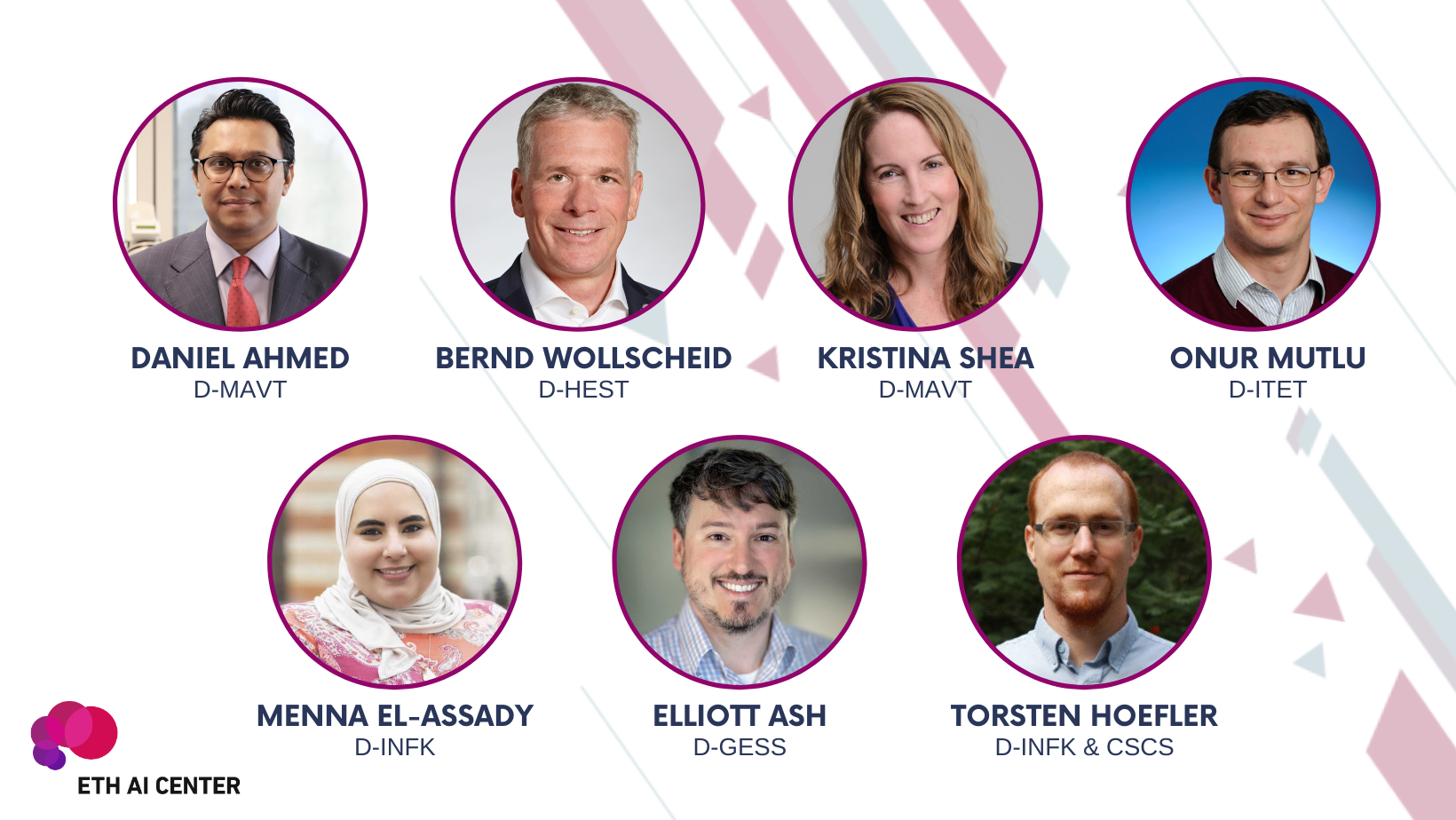ETH AI Center extends its faculty
Daniel Ahmed (D-MAVT), Bernd Wollscheid (D-HEST), Kristina Shea (D-MAVT), Onur Mutlu (D-ITET) and Menna El-Assay (D-INFK) join ETH AI Center as new faculty members. Elliott Ash (D-GESS) and Torsten Hoefler (D-INFK and CSCS) are advanced from associated to core faculty. Warm welcome!

ETH AI Center proudly welcomes five new faculty members:
Daniel Ahmed was born in Dhaka, Bangladesh. He is an Assistant Professor of Acoustic Robotics in Department of Mechanical and Process Engineering at ETH Zurich. Currently, he leads the Acoustic Robotic Systems Lab (ARSL), located in the Binnig and Rohrer Nanotechnology Center, and is engaged in pioneering ultrasound robotics for use in life science applications, diagnostics, and translational medicine.
Bernd Wollscheid is a Professor for Chemical and Systems Biology. He and his team develop and apply chemoproteomic technologies which enable the decoding of the extracellular interactome: The goal of the Wollscheid laboratory is to functionally understand the cellular surfaceome and its signaling islands as a complex information gateway connecting the intracellular to the extracellular interactome. They develop and apply next generation technologies at the interface of biology, chemistry, medicine and bioinformatics to generate unprecedented data to establish the surfaceome proteotype and its signaling interaction network. This digital proteotype data layer provides the basis for generating qualitative and quantitative surfaceome models explaining how molecular nanoscale organization influences cellular signaling and biological function.
Kristina Shea is a Full Professor for Engineering Design and Computing in Mechanical and Processing Engineering at ETH Zürich since 2012. Her diverse, multidisciplinary research interests include Design for Additive Manufacturing and 4D printing, designing low-cost and sustainable products and constructions for low-resource settings as well as conceptual design methods, design synthesis, shape and graph grammars, generative design and design automation.
Onur Mutlu is a professor for Computer Science at the departnement of Information Technology and Electrical Engineering. His research is in computer architecture, systems, security, and bioinformatics, spanning the whole ecosystem from applications, systems, languages, system software, compilers, to hardware. He is especially excited about novel, fundamentally-secure and fundamentally-efficient computation, communication and memory/storage paradigms, applied to emerging systems, technologies, and bioinformatics/medical applications, as well as system design for bioinformatics and biologically inspired computing paradigms.
Menna El-Assady is a computer scientist working at the intersection of data analysis, visualization, computational linguistics, and explainable artificial intelligence. She is passionate about interdisciplinary research, as it continually provides an opportunity to broaden horizons beyond disciplinary boundaries. She is specifically interested in advancing responsible data-driven decision-making through humancentered analytics, as well as interactive and explainable machine learning. Menna joined the EZH AI Center already in 2021, when she became one of our first post-doctoral fellows. She was appointed to Tenure Track Assistant Professor of Computer Science in the Department of Computer Science in September this year.
Furthermore, two existing members were advanced from associated to core faculty:
Elliott Ash is an Assistant Professor of Law, Economics, and Data Science at ETH Zurich's Center for Law & Economics. His research and teaching focus on empirical analysis of the law and legal system using techniques from econometrics, natural language processing, and machine learning.
Torsten Hoefler is a full professor at the Department of Computer Science at ETH Zurich. In this role, he has headed the Scalable Parallel Computing Lab since 2012. The highly distinguished specialist in the field of HPC and ML has for years acted as an important link between CSCS and researchers in classical scientific fields such as physics, climate research, and materials research. Earlier this year, Torsten was appointed to Chief Architect for Machine Learning at the Swiss National Supercomputing Centre (CSCS).
We're looking forward to working with you!